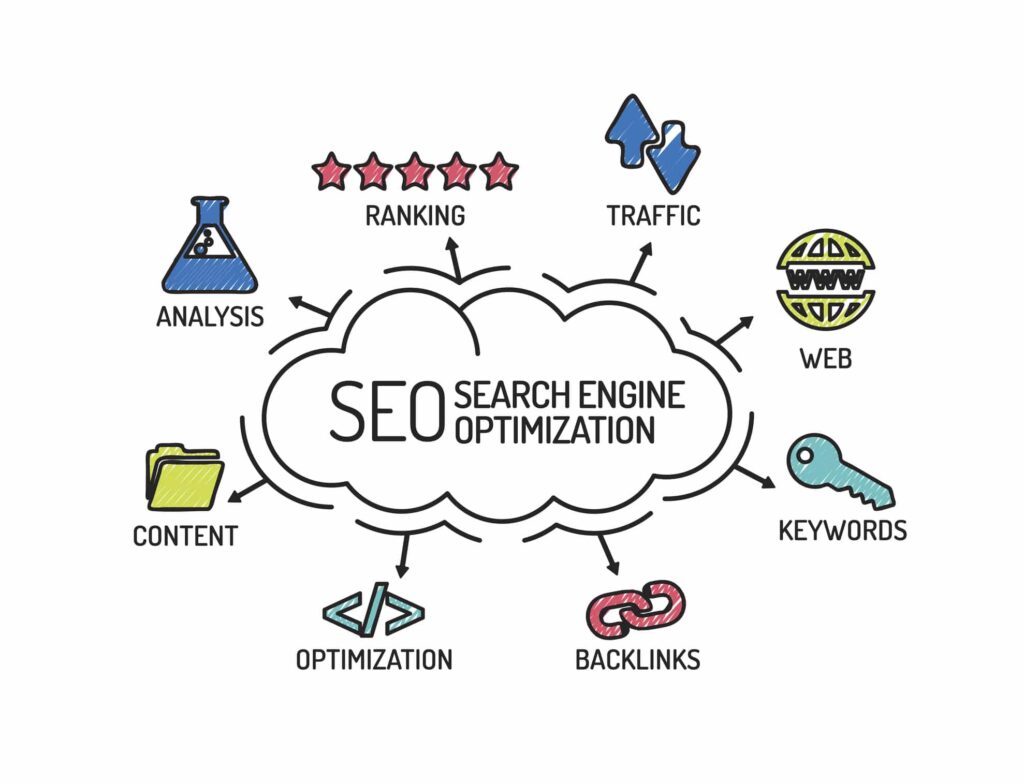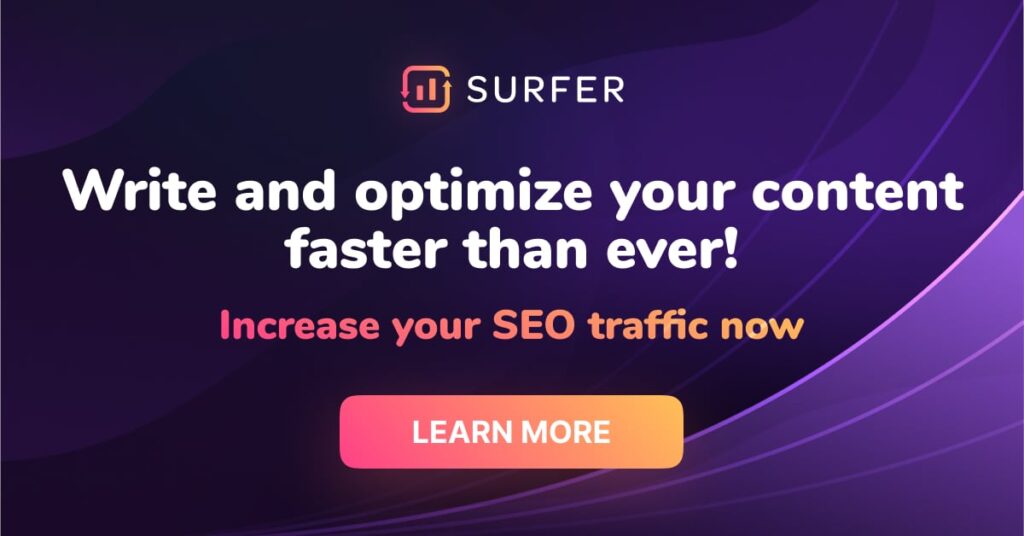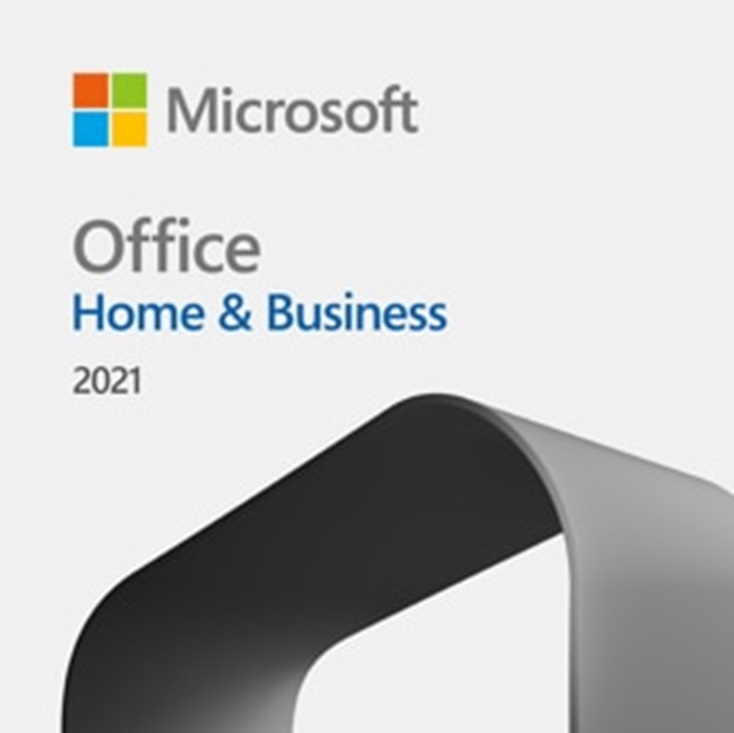
The internet is a digital platform where millions of websites compete for attention. Imagine your website is a hidden gem, a fantastic boutique with unique offerings in a charming alleyway. Sadly, it’s getting lost in the crowd amidst the online hustle and bustle. How do you lure shoppers to discover your treasures? That’s where the magic of SEO marketing (search engine optimization) steps in.
SEO (search engine optimization) is your digital spotlight. It’s the secret technique that helps your website shine brightly in search results like Google and Bing. Think of it as hiring a team of expert sign spinners strategically placed throughout the city, enthusiastically pointing the way to your online store.
This isn’t some trick, though. SEO is about understanding how search engines ‘think’ and then optimizing your website and search results to speak their language. It helps them realize, “Hey, this website is exactly what searchers are looking for.”
Table of Contents
What Is SEO Marketing?
SEO stands for Search Engine Optimization. Think of it like transforming your website into a top contender for search engine games! Imagine it vying for those coveted first-place spots on Google, Bing, Yahoo, and other search result leaderboards. Search Engine Optimization is the intensive training program that gets your website into its best possible shape for the competition.
SEO marketing isn’t just a straightforward technique; it’s a whole strategy. SEO marketing strategies focus on making your website appealing to search engines. The goal? When someone searches for something related to your business—whether it’s “vegan recipes,” “plumbing repair near me,” or even “best funny animal videos,” you want your website to be among the top results they see.
Because appearing higher in search results means more people will discover you. It’s the digital equivalent of having a prime storefront location on a bustling main street.
If you want to know how AI is used in SEO and different ways to use AI in Marketing , you can refer How to Use AI in Marketing
How Do Search Engines Work?
Think of search engines as the web’s tireless digital archivists. Unlike traditional librarians focused on books, they manage websites’ vast, constantly evolving landscape. A strong understanding of how they work is fundamental to successful search engine marketing. Let’s break down their essential functions:
Crawling:
Search engines deploy armies of tiny programs called bots, crawlers, or spiders. These bots tirelessly scour the internet, following links like intricate pathways between websites. They’re constantly hunting for new web pages or updates to existing ones. Think of it like discovering hidden sections and recently added books in a massive library.
Indexing:
Once a bot stumbles upon a web page or web pages, the search engine dives into its content. It meticulously analyzes text, images, videos, and even the underlying code, trying to decipher the page’s core topic and purpose. This is akin to a librarian reading a new book, jotting down keywords, and deciding where to categorize it for easy retrieval. All this information is stored in a vast index, a meticulously organized digital archive.
Ranking:
Here’s where the magic truly happens. When you type a query into a search engine, it doesn’t just randomly grab some pages. Instead, it scans its colossal index in milliseconds, sifting through potentially millions of websites.
Complex algorithms act like expert librarians, considering hundreds of factors (like relevance, authority, and even how fast your site loads) to determine the most helpful pages for your search.
Finally, it presents these on the search engine results pages (SERPs), typically showcasing the most relevant matches at the top. This ranking process is where search engine marketing strategies focus on boosting a website’s visibility.
What is the difference between Paid search vs. organic search
Picture the first page of search results as valuable real estate. There are two ways businesses can snag a spot:
Paid Search (PPC):
Imagine paid search as buying premium advertising space on a bustling digital highway. With pay-per-click (PPC), businesses compete to display their websites at the top whenever someone searches for specific keywords. These listings often have a small “Ad” tag to show they’re sponsored results.
Organic Search:
This is like building an incredible shop right on the main street that naturally catches the eye of passersby. Organic results are achieved through SEO, the process of making your website so appealing to search engines that they rank it highly without any payment involved.
Why Do Both Matter?
Paid and organic search can be a powerful team. Paid search offers lightning-fast visibility, which is great for immediate launches or promotions. Organic search is a long-term investment in building a lasting online presence.
The Trust Factor:
You’re right! Studies show that people tend to click on organic results more often. There’s a sense of those results being ‘earned’ due to their value and relevance, not just purchased. However, don’t underestimate well-crafted ads; they can be equally interesting if they clearly answer the search query.
Why Is SEO Marketing Important?
An effective SEO marketing strategy is like having a 24/7 megaphone for your business in the vast online world. Here’s why it matters:
Drives Organic Traffic: SEO is your ticket to free, highly targeted traffic. Unlike paying for every click, SEO helps the right people find you when they’re already searching for your type of products or content. Imagine your website becoming the eye-catching, always-open storefront on the busiest street in town.
Boosts Brand Visibility: Appearing at the top of search results is like having a giant digital billboard promoting your brand. Even if someone doesn’t click immediately, they see your name, logo, and website snippet. This repeated exposure builds recognition and familiarity, essential for establishing yourself in the market.
Builds Credibility: Achieving top rankings in search results isn’t easy. It signals to both users and search engines that you’re not just some random website, but a relevant, trustworthy source of information. Think of it as earning a highly sought-after badge of online authority – people are likelier to do business with someone they can trust.
Cost-Effective: While SEO requires time and effort, the long-term results can be astonishing. Unlike paid advertising, where the traffic stops when your budget runs out, good SEO is the gift that keeps on giving. It’s an investment in your digital presence that can pay dividends for years to come, often delivering a far better return on investment (ROI) than many other marketing strategies.
What are the Types of SEO Marketing
On-Page SEO:
Internal linking:
Strategically linking between related pages on your website has multiple benefits. It helps search engines grasp the structure of your site and understand which content is most important. Plus, it creates easy paths for visitors to discover more useful information, keeping them engaged.
Keyword Research:
Think of keyword research as tapping into the thoughts of your potential customers; it’s the cornerstone of successful SEO. This process uncovers people’s exact words and phrases when searching for products, services, or information related to their niche. Understanding these search terms lets you tailor your website’s content (like blog posts and product descriptions) to perfectly align with what people are looking for. Imagine it like strategically placing a lemonade stand on a scorching day, right where thirsty crowds are already seeking refreshment! To get started, brainstorm potential search terms, putting yourself in your ideal customer’s shoes. Then, let keyword research tools expand your list, providing insights into search volume. Finally, analyze the results carefully and aim for terms with decent search volume but less competition, giving you a better chance to stand out in search results.
Content Optimization:
Sure, you’ve found amazing keywords through your research. But simply sprinkling them throughout your text won’t cut it. Content optimization is about creating valuable, informative pieces that people will love reading and sharing. Here’s how:
Solve Problems, Answer Questions: Your content should directly address your audience’s needs. Are they looking for a how-to guide? An in-depth comparison of products? Deliver solutions tailored to their search intent.
Structure is Key: Break up your text with headings (H1, H2, etc.), short paragraphs, and bullet points for easy readability. This also signals to search engines how your content is organized.
Weave in Keywords Naturally: Once you have amazing content, it’s time to include those keywords you researched. Don’t force it! Aim for seamless integration – the terms should fit naturally into your sentences.
Think Beyond Text: Images, videos, and infographics can be fantastic additions to your content. Optimize these elements as well (remember those descriptive file names and alt text for images!).
Title tags and Meta descriptions:
A title tag is like the headline of your webpage. It appears in the blue, clickable text on search engine results pages (SERPs). Think of it as the attention-grabbing sign displayed outside your shop – it needs to pack a punch! Here’s why title tags are so important:
First Impressions Matter: Your title tag is often the first thing a potential visitor sees. It must accurately describe your page’s content and entice people to click.
Keyword Powerhouse: Make sure your main keyword is placed strategically within the title tag, preferably closer to the beginning. This signals relevance to search engines.
Stay Within Limits: Search engines cut off title tags that are too long. Aim for around 50-60 characters to see your full title displayed.
Meta Descriptions: The meta description is the short snippet of text (usually around 150-160 characters) that appears beneath the title tag on SERPs. It expands on your title, offering more detail about what the page provides. Here’s how to make it work:
Craft a Call to Action: Entice people to learn more with verbs like “Discover,” “Explore,” or “Shop now.”
Include Relevant Keywords: Naturally, weave in a secondary keyword or two if it fits.
Seal the Deal: Your meta description should be considered a mini advertisement to convince people that your site has the answers they need.
Image optimization:
Images can boost your SEO. When you upload images, use descriptive file names that include relevant keywords (think “blue-yoga-pants.jpg” instead of “IMG1234.jpg”). Additionally, ‘alt text’ is a short description that tells search engines (and visually impaired users) what the image is about.
Technical SEO:
Think of technical SEO as the foundation of your online house. While on-page SEO focuses on sparkling interior design (your content!), technical SEO ensures the structure is sound. It encompasses aspects of your website that help search engines easily find, crawl, understand, and index all your fantastic content.
Here are some key areas of technical SEO and why they matter:
Site Speed: Nobody likes a slow-loading website in today’s fast-paced world. Search engines, including Google, factor site speed into their rankings. Optimize images, streamline code, and consider a fast web host to make your site snappy.
Mobile Responsiveness: Mobile devices now dominate how people browse the web. Your website needs to look great and function seamlessly on smartphones and tablets of all sizes. If not, search engines will penalize you.
Crawlability and Indexation: Ensure search bots can easily navigate your site. Clean up broken links, optimize your site structure, and utilize tools like XML sitemaps to guide search engines through your content.
Structured Data: This unique code helps search engines understand the nature of your content (recipes, products, event listings, etc.). Implementing schema markup gives you a chance to score those rich, eye-catching snippets within search results.
Off-Page SEO:
Off-page SEO shifts the focus beyond your website, establishing your credibility and authority within the wider web world. It’s about gaining the trust of both search engines and users. Let’s explore those key techniques:
Link Building: The Power of Endorsements Think of links from other reputable websites to yours as digital “votes of confidence.” Search engines see these as signals that your content is valuable and trustworthy. Aim for high-quality, relevant websites to link back to yours. It’s far better to have a few excellent links than dozens of spammy ones!
Social Media: More than Just Sharing While direct links from many social media platforms don’t always impact SEO, these channels are incredibly valuable. Sharing your content, sparking conversations, and engaging with your audience builds brand awareness and can indirectly drive traffic to your site. All these positive signals tell search engines that your brand is active and worth paying attention to.
Local SEO:
Dominating Your Neighborhood: Local SEO is essential if you have a brick-and-mortar business or serve a specific location. Claiming and optimizing your Google Business Profile, getting listed in relevant online directories, and encouraging customer reviews help you stand out when people search for “[your service] near me.”
SEO Case Studies
SEO case studies provide tangible proof of the strategies you’re teaching. Outline a real-world business scenario, their goals, the specific SEO techniques implemented, and the results achieved (rankings boost, increased traffic, improved conversions, etc.). By showcasing measurable wins, you inspire readers and cement your credibility as someone who produces results.
SEO Mythbusting
The SEO landscape is riddled with misinformation and outdated advice. A dedicated myth-busting section can become a go-to resource for your readers. Popular myths to tackle include things like “keyword stuffing is effective,” “you need tons of backlinks from anywhere,” or “SEO is a one-and-done task.” By clarifying these, you help businesses avoid pitfalls and make smarter choices with their SEO efforts.
Industry-Specific SEO Tips
Demonstrate that you understand the unique challenges faced by different niches. An e-commerce shop must optimize product pages and deal with frequent inventory changes. A healthcare provider focuses on local SEO and handling potentially sensitive information according to regulations. By tailoring advice, you position yourself as a true expert in your readers’ fields, fostering deeper trust and engagement.
Conclusion
SEO is an ongoing process, not a quick fix. However, the potential returns for businesses of all sizes make it a remarkably worthwhile investment. By consistently improving your website’s search engine optimization, you establish a powerful, long-term source of qualified leads and enhance your online authority.
If you’re ready to harness the potential of organic search, here are some key next steps: Perform an SEO audit to assess your website’s strengths and weaknesses. Prioritize keyword research to understand the search terms your target audience uses. Optimize and expand your content, refining existing material and creating new, high-quality pages aligned with your keywords. Finally, stay current with the dynamic SEO field by following reputable industry resources to keep pace with algorithm updates and best practices.
Frequently Asked Questions (FAQs)
Q1: What’s the main difference between on-page and off-page SEO?
On-page SEO focuses on optimizing everything you directly control within your website, like your content and page structure. Off-page SEO involves building your reputation and authority across the wider web, like earning links from other websites. Both are crucial for success!
Q2: I’m on a tight budget. Is SEO still worth it?
Yes. While SEO takes time, it’s incredibly cost-effective in the long run. Unlike paid advertising, where results stop when you stop paying, good SEO pays dividends for years to come.
Q3: How long will it take to see results from SEO?
There’s no one-size-fits-all answer. SEO is a marathon, not a sprint. However, by consistently applying the right strategies, most businesses start seeing improvement within a few months, with significant gains over longer periods.
Q4: Do I need to hire an SEO expert, or can I do it myself?
This depends on your time, budget, and level of tech-savviness. There are many excellent resources to guide you if you want to tackle SEO yourself. However, an experienced SEO professional or agency can accelerate your results for complex websites or highly competitive fields.
Q5: How often should I update my website for SEO?
There’s no set rule here! Focus on regularly creating high-quality content that adds value for your audience. Also, revisit older content to keep it fresh and accurate. You are staying active signals to search engines that your site is alive and worth ranking well.

